Combining advanced research with the best care, the facility’s doctors and scientists will guide the way for new solutions to cardiovascular disease
Tampa, FL (Dec. 17, 2013) — The University of South Florida today broke ground for a cutting-edge facility dedicated to changing the future of heart health by bringing together the latest research with the best cardiovascular care.
The groundbreaking ceremony represents an important milestone in making the vision for the USF Health Heart Institute a reality.

L to R: Mark Sharpe, chair, Hillsborough County Board of County Commissioners; USF President Judy Genshaft; Will Weatherford, speaker, Florida House of Representatives; Dr. Stephen Liggett, vice dean for research, USF Health Morsani College of Medicine; Dr. Harry van Loveren, interim dean, Morsani College of Medicine; and Dr. Arthur Labovitz, chair, USF Health Department of Cardiovascular Sciences.
The proposed $50-million, five-story, 100,000-square-foot facility will be built at the center of the university’s health campus — a dynamic hub of biomedical research that includes the USF Health Byrd Alzheimer’s Institute, Moffitt Cancer Center and the USF Health Morsani College of Medicine.
Within the multidisciplinary Institute, USF Health will bring together all the advanced technology and research needed to discover the most effective, creative solutions for heart disease, stroke, diabetes and other cardiovascular diseases.
Heart disease is the leading cause of death in the nation and, according to Florida Vital Statistics 2012, ranks a close second in Florida (narrowly following cancer). It is also a leading cause of hospitalizations and lost productivity.
“This is landmark day for the University of South Florida and all those in Tampa Bay and the State of Florida who have friends or family affected by heart disease,” USF President Judy Genshaft said. “That is really is most of us, because heart disease is the number one killer in the nation. More than 40,000 in Florida alone die each year from heart disease and countless others are impacted.”
“USF is working tirelessly to make heart disease less of a threat to the health and well-being of our community. Today, we take a huge step forward in our efforts as we begin work on building our new USF Health Heart Institute,” she said. “We’re creating the scientific infrastructure that will make Florida a world leader in combating devastating diseases.”

USF President Judy Genshaft called it a landmark day for the University of South Florida and for all those in Tampa Bay region and the state who have friends or family affected by heart disease.
The project has secured $21.4 million in total funding, with anticipated funding of $30 million needed to complete construction. The State of Florida contributed $19.4 million over the last two years, joined by Hillsborough County, which approved $2 million in funding support last year. In addition, USF plans to invest up to $25 million in resources for genomics-based medicine research and recruitment of faculty.
The facility will include an auditorium, blood sample repository for genetic testing, four core laboratories and office space designed for interdisciplinary collaboration, as well as a clinical care center. The project is expected to attract high-wage jobs, industry partnerships, patents and other products that will advance economic development based on biotechnology.
Built with a community of partners
“From the day we began talking about how USF Health could do more to fight the causes and symptoms of heart disease, we have had an entire community of supporters working with us,” said Harry van Loveren, MD, interim director of the Morsani College of Medicine. “We will accomplish all of this because of their collective efforts.”
Governmental leaders both for the state of Florida and for Hillsborough County as well as community and hospital partners, including Tampa General Hospital and Florida Hospital Tampa and its Pepin Heart Institute, worked with the university to advance the USF Health Heart Institute.

Will Weatherford, speaker of the Florida House of Representatives, has championed the USF Health Heart Institute from the beginning.
In particular, President Genshaft recognized the leadership of Will Weatherford, speaker of the Florida House of Representatives, for championing the Heart Institute from the beginning.
“The legacy of his work on this project is something that will benefit generations to come,” she said.
Weatherford told the crowd gathered for the groundbreaking that the future site of the USF Health Heart Institute was the “heart” of where innovation was happening on the USF campus and across the Tampa Bay region.
“I can tell you that the Legislature, myself, and the Florida House are committed to seeing this project through — not just funding it, but making sure the resources and policy are embedded around it to make this a world-class institution in Tampa Bay and the State of Florida,” Weatherford said. “I can’t think of anything we will do in this next legislative session that’s going to make a bigger difference for people right here in this community than what we’re doing with this Heart Institute.”
The leadership and scholarly activity of many dedicated physicians and scientists at USF Health, including the USF Health Heart Institute’s acting directors Stephen Liggett, MD, vice dean for research at the Morsani College of Medicine, and Arthur Labovitz, MD, chair of the Department of Cardiovascular Sciences, helped lay the foundation for the institute and will navigate its ongoing work.
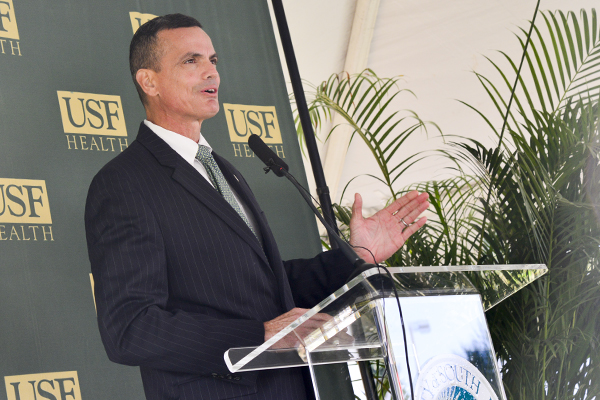
Mark Sharpe, chair of the Hillsborough County Board of County Commissioners, said the county was eager to partner with USF on a project that will improve lives and spur economic development.
Mark Sharpe, chair of the Hillsborough County Board of County Commissioners, said the county was excited to partner with USF and invest in the forward-thinking, strategic project that will improve lives and spur economic development.
“We understand that health care is going to drive our state and our region,” Sharpe said. “With the tremendous team and the rock star research here, we’re going to do some great things.”
The future of heart research
The pipeline of new drugs for cardiovascular diseases is relatively dry. That’s in part because the root causes of heart disease, including molecular and genetic aspects, are largely unknown or are more complex than anticipated, Dr. Liggett said.
The research performed at the Heart Institute will advance the fundamental understanding of cardiovascular diseases and will determine the best ways to apply the novel laboratory findings to benefit patients.
“The new knowledge will lead to new diagnostic tests to identify those at greatest risk for heart disease, so we can begin preventive measures early,” Dr. Liggett said.
The discoveries will also lead to new and improved treatments based on genetic signatures and other biomarkers of disease. The findings may help guide selection and dosage of existing drugs to reduce side effects and optimize patient outcomes.

Dr. Harry van Loveren, interim dean of the USF Health Morsani College of Medicine, is interviewed by Mark Schreiner of WUSF University Beat.
The institute will promote what Dr. Liggett calls a “bench-to-bedside-to-bench” approach.
On the bench-to-bedside part of the equation, the institute’s researchers will continually strive to understand the underpinnings of the disease with a focus on direct application to prevention and patient care. On the bedside-to-bench part, doctors may notice that a new drug undergoing clinical testing for one cardiovascular disease improves another. This information can be fed back to the laboratory scientists to investigate how the unexpected positive outcome occurs, possibly leading to a new treatment.
“The sharing of basic and clinical research data in both directions can lead to better outcomes,” Dr. Liggett said.
One of the major areas of research emphasized by the institute will be genomics.
“Your DNA already knows if you’re going to have a heart attack and when. Your DNA already knows if one of our drugs will save your life or won’t,” Dr. van Loveren said. “The heart research that will be done here will unlock the secrets of your personal DNA, see into your future and hopefully change it… Because of what we learn here, your children and my children will live happier and healthier lives.”

University, governmental and community leaders gathered for the groundbreaking in the heart of the university’s health campus, a dynamic hub of biomedical research.
Raising the profile of region’s cardiovascular care
USF Health recently began its first genomic trial that links DNA analysis from blood samples to the American College of Cardiology’s clinical database of millions of patients with heart disease.
It’s just the start.
The Heart Institute will provide a home for the region’s only academic health center and its hospital partners to study every promising research avenue – from new molecular targets to looking at how differences in individual DNA may affect people’s cardiovascular health to investigating the potential of gene therapy or stem cells to repair a damaged heart.
The focus will be on translating basic science and research discoveries into well-designed clinical trials to improve patient care.
“The collaborative work we do will elevate the level of excellence for cardiovascular diagnostics and care in the Tampa Bay region,” Dr. Labovitz said.
“We will attract leaders in the field and offer patients opportunities to participate in a full range of clinical trials for cardiovascular diseases, including heart failure, coronary artery disease, arrhythmias and hypertension.”
– Lisa Greene contributed to this report.
Photos by Eric Younghans, USF Health Communications, and video by Joshua Jackson, USF Health Information Systems
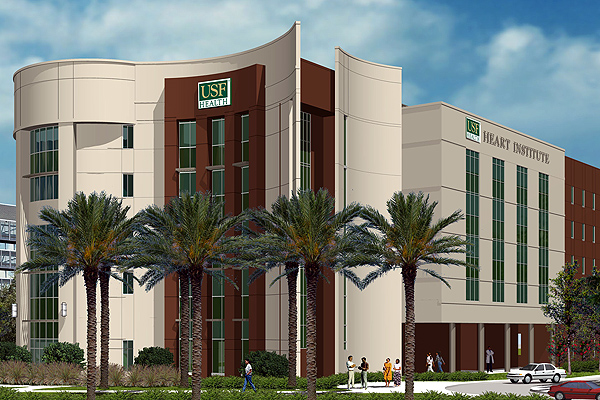
Preliminary rendering of the USF Health Heart Institute

L to R: Dr. Stephen Liggett, vice dean of research, Morsani College of Medicine; Dr. Arthur Labovitz, chair of Department of Cardiovascular Sciences; Dr. Donna Petersen, interim senior vice president for USF Health and dean, USF College of Public Health; Will Weatherford, speaker of the Florida House of Reprsentatives; and USF President Judy Genshaft.

University, governmental and community leaders, as well as hospital partners, attended the groundbreaking ceremony.
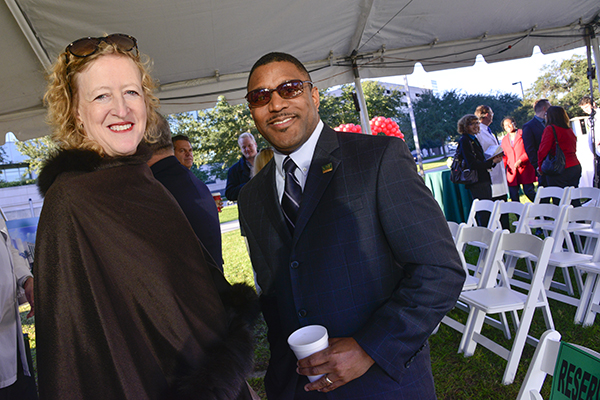
Dr. Petersen, left, with Dr. Kevin Sneed, dean of the USF College of Pharmacy
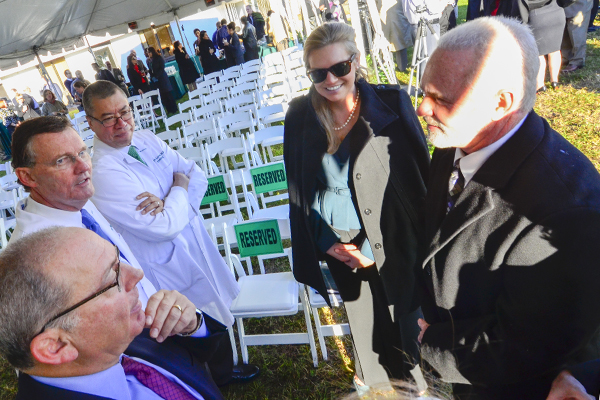
USF Health leaders chat with, at right, Tom and Lauren Pepin.

The USF ambassadors were on hand to greet guests.
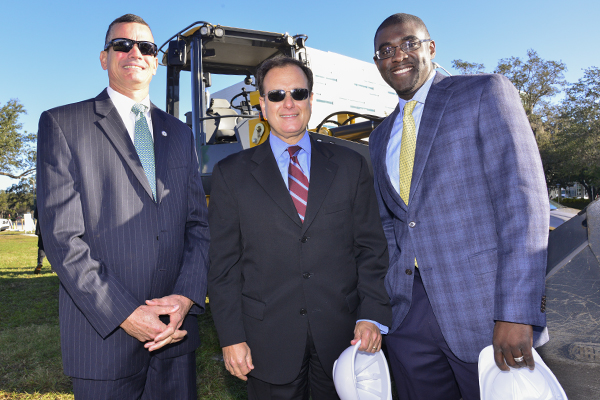
L to R: Mark Sharpe, chair of the Hillsborough County Board of County Commissioners; John Ramil, chair of the USF Board of Trustees; and Brian Lamb, USF BOT member.
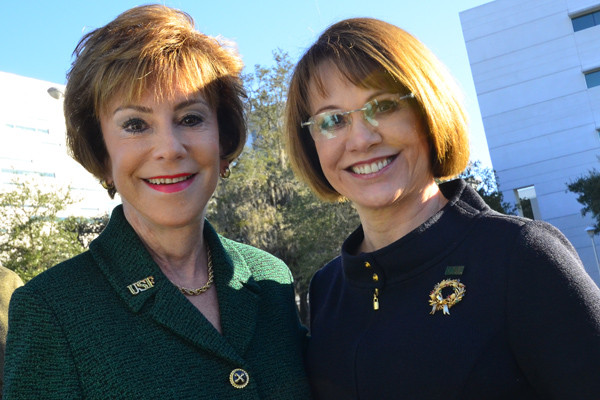
USF President Judy Genshaft with Nancy Watkins, a member of the USF Board of Trustees.

The institute will change the future of heart health by bringing together the latest research with the best cardiovascular care.

An impressive team of community and hospital partners worked with USF to help make the vision of the USF Health Heart Institute a reality.

L to R: Steve Blair, associate vice president and chief development officer for USF Health, with Lauren and Tom Pepin
